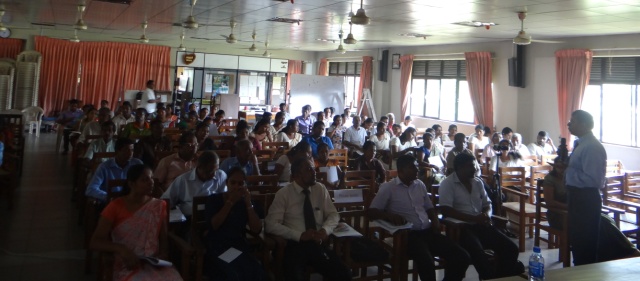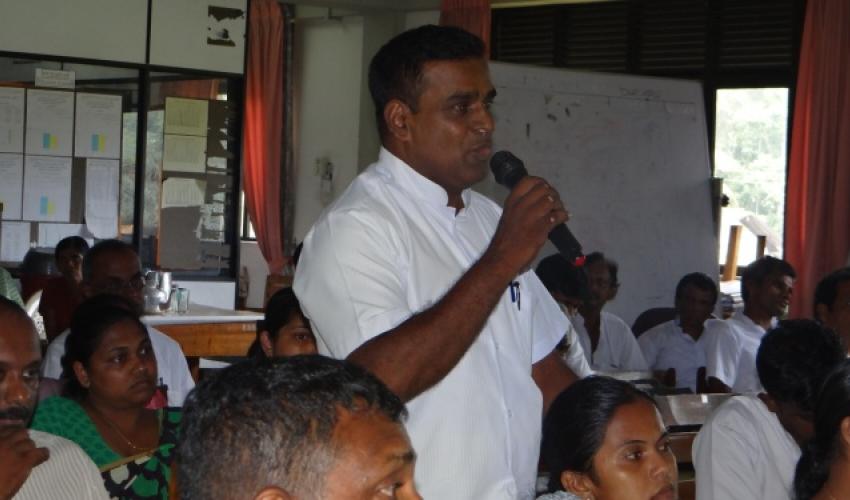The fourth division – Seethawaka Divisional Secretariat Division – joins hands with the Kelani River Multi-Stakeholder Partnership
The operationalizing of the Kelani River Multi-Stakeholder Partnership Approach (KRMP), led by IUCN in partnership with Brandix Limited (www.brandix.lk) took another step forward by engaging government officials and volunteers with the Seethawaka Divisional Secretariat, to promote Public-Private-Community Partnerships (PPCPs) to conserve the Kelani River Basin. As such, the fourth divisional level event was conducted at the Seethawaka Divisional Secretariat on 27 October 2017.

Dr Ananda Mallawatantri addressing the participants
Photo: IUCN Sri Lanka
Ms K.S. Dilhani, the Divisional Secretary of Seethawaka, Dr Ananda Mallawatantri, Country Representative of IUCNSL, Mr Jinasiri Dadallage, former Secretary, Ministry of Public Administration and Ms Dinithi Samarathunga, Project Officer (KRMP) participated in the event. Mr J. Wijesinghe, Chief Chemist of the National Water Supply and Drainage Board participated as a special guest of this event.
 Photo: IUCN
Photo: IUCN
Around 150 volunteers representing 22 Grama Niladhari Divisions in the river basin (Seethawaka, Pahala Hanwella, Niripola, Dikdeniya, Neluwanthuduwa, Brandigampola etc.) and around 15 Grama Niladhari’s from other Grama Niladhahri Divisions under the Seethawaka Divisional Secretariat participated to pledge their support for the programme. The private sector was represented by Teejay Lanka, Lanmix Exports (Pvt) Ltd, Latex Green, Prime Polymers, Lalan Rubbers and CBL exports. Welcoming the participants, Ms. K. S. Dilhani highlighted the importance of community engagement in a project of this nature.
Dr Mallawatantri, who facilitated the first session, briefed the participants on the KRMP approach, water quality indicators, best management practices, impact of water quality on health, progress to-date and also shared his international experiences. Ms Dinithi Samarathunga presented minor watershed health report cards of the 71 minor watersheds with special emphasis on water quality health cards of the Seethawaka Divisional Secretariat.
The next session was facilitated by Mr Jinasiri Dadallage, during which he presented targets and result oriented approaches for environment protection. He highlighted the importance of accountability, leadership, awareness, responsiveness and transformation in the mindset of the people in regard to protecting the environment. Mr Dadallage also explained how the village level planning can be strengthened using a simplified socioeconomic survey tool to create baseline indicators. The baselines generated will enable the village level groups to plan the interventions, implement and monitor them. Village level interventions will be implemented at Grama Niladhari Division levels for coordination purposes.
The participants were given instructions/guidance along with maps to identify the requested data comprising of households, agriculture, services, environment, health and livelihoods. The event also served as a platform for the participants, especially for those in the private sector, to bring out and voice pressing issues that hinder them in preserving their surrounding environment.
During the discussion participants highlighted the problems they face due to the presence of a large number of piggeries in the Grama Niladhari Division located in Seethawaka especially in the Niripola Grama Niladhari Division and how Wak Oya, a minor stream of the Kelani River is being contaminated due to waste water. According to their statistics these piggeries have around 6,000 pigs.
Other issues highlighted were illegal gem and sand mining, washing of soil to get sand and quarry sites in most of the Grama Niladhari Divisions. Lack of knowledge on best management practices such as composting, home gardening etc. were also pointed out as drawbacks. They also shared information about ongoing biogas facilities at this division. Participants agreed to work together at Grama Niladari levels and develop action plans within a month. The Grama Niladhari officials who were not in the boarder of the Kelani River basin also showed interest in adopting the same approaches in their divisions as well showcasing the wide reach and appeal of the KRMP programme.
Along with this fourth Divisional Secretary level programme, the number of volunteers in the KRMP approach increased to 893.
The KRMP PPCP approach is being carried out in nine DS divisions with the funding of Brandix Lanka and implemented by IUCN Sri Lanka.
